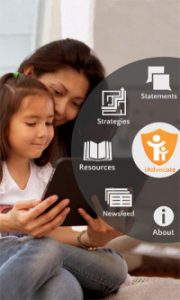Syracuse University School of Education associate professor Alan Foley has designed and launched a new iPhone app to help parents better advocate for their children with disabilities. iAdvocate is a free application available through iTunes that provides information on advocacy strategies for parents to help ensure school-aged children with disabilities are provided appropriate services and resources in their education.
 The idea behind iAdvocate is to empower and engage parents, make them aware of their rights and introduce them to a variety of resources, says Foley. He hopes the app better prepares parents to work more collaboratively with school professionals to achieve positive outcomes for their children’s education.
The idea behind iAdvocate is to empower and engage parents, make them aware of their rights and introduce them to a variety of resources, says Foley. He hopes the app better prepares parents to work more collaboratively with school professionals to achieve positive outcomes for their children’s education.
“We hope it can improve access and services for children with disabilities and provide help and support for their parents.”
Foley incorporated the project into his classes last year, and also worked with a team of School of Education graduate students. The students helped conduct focus group studies with parents involved in the SU Parent Advocacy Center (SUPAC), develop content and design a prototype. Foley also collaborated with the School of Education, the Center on Human Policy, Law and Disability Studies and SUPAC on the project.
Thomas Bull, regional facilitator for the S3TAIR project, said iAdvocate will be helpful to parents of children with disabilities. S3TAIR is a federal grant-funded state project designed to improve outcomes for students with disabilities.
“iAdvocate is a tool that provides functional strategies, a wide range of resources and straightforward suggestions that allow for parents, teachers and students to understand their rights, even the playing field when working with school districts and design an educational program that is responsive to their input and tailored to meet their specific need,” Bull says.
The app contains three sections for users—strategies that parents can pursue as advocates; resources, information and links to laws, books, articles, websites, videos and organizations that can provide information on inclusive education; and responses, which features simulated conversations between parents and school professionals. The app also connects to the SUPAC website, which provides additional exchanges of information and ideas.
Foley plans to create updates for the app as well as explore and develop other apps.
